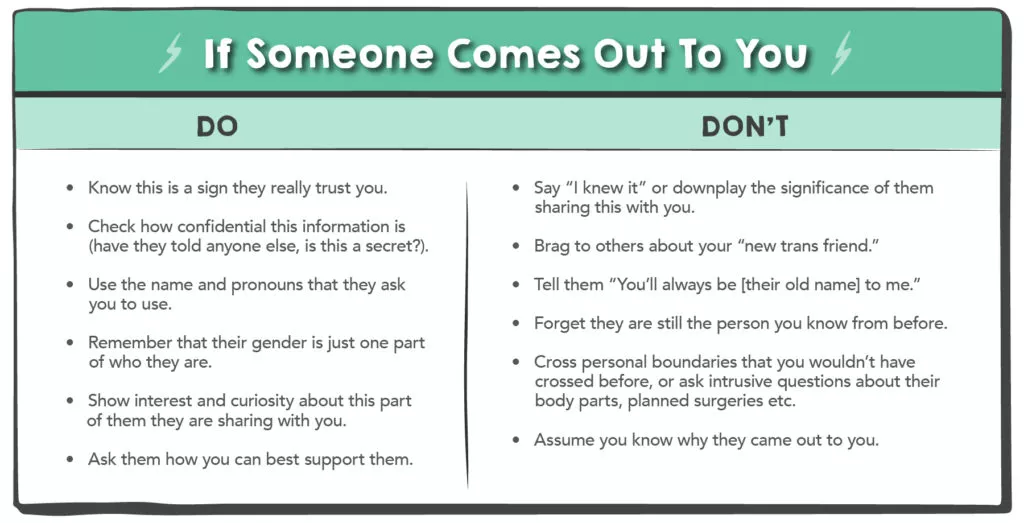If you want to be there for your friend during this important time in their life, you’ve come to the right place! While there is no one “right” answer to every situation you might encounter, these tips should help you on your way.
1. Be Patient
If your friend is questioning or exploring their gender identity or gender expression, it may take some time for them to figure out what’s true for them. They might, for example, use a name or pronoun, and then decide at a later time to change the name or pronoun again. Understand that this is all part of the process, and respect your friend’s identity, no matter whether it changes or stays the same. They are the ones who know themselves best!
2. Respect your Friend’s Identity
Transgender people use many different terms to describe their experiences (transgender, transsexual, nonbinary, genderqueer, etc.). Use the same words that your friend uses to describe themselves, as well as the name and pronouns that they ask you to use. Ask your friend if they would like you to correct others (e.g., classmates, teachers) if the wrong name or pronoun is used. Remember, your friend may feel comfortable sharing their journey with you, but might not yet be ready to share that with other people in their life. It can be helpful to ask for clarity about who they’ve shared this with, and where it is safe for you to use their affirming name and pronouns.
Trans women are women, no matter if they have, or did have, bodies that people tend to consider “male.” Trans men are men, no less than any other man. When people say they are neither man nor woman, that is their true experience.
Trans people are not members of the genders that they were assigned at birth. Someone who has transitioned is not an “ex-boy” or an “ex-girl.” A trans man, even if he was born with a reproductive system that is most commonly found in females, is not (and never has been) a woman. He was labeled as a girl when he was young, but that label was incorrect. He is a “real man.”
Your friend might choose to access medical care like hormones and surgeries as part of their transition to align their bodies with their gender identity. Or they might want their authentic gender identity to be recognized without hormones or surgery. Some transgender people cannot access medical care, hormones, and/or surgeries due to a lack of financial resources or access to healthcare.
If your friend is not sure which identity label fits them best, let them figure it out for themselves. Don’t tell them which term you think they should use. Gender is not dependent on physical appearances, or on the word of doctors, friends, or family. Allow your friend to define themselves. Accept that if your friend tells you they are transgender, they are.
3. Don’t “Out” your Friend to Others
Your friend’s transgender history is personal information that they may or may not feel comfortable sharing with others. Be careful to call them by the name and pronouns they ask you to use. Don’t call them by their old name or tell everyone about your “new trans friend.” Much of the world is unfortunately very intolerant of gender diversity. Trans people may lose their jobs, housing, friends, or even their lives when other people find out they are transgender.
“Coming out” as transgender is different to “coming out” as lesbian, gay, or bisexual. In the lesbian, gay, and bi community, “coming out” is typically seen as revealing a truth that allows other people to know their authentic self. A lot of importance and value is put on the idea of being “out” in order to be happy and whole. For trans people, “coming out” means something different.
A transgender person who is living their life as their authentic self is living their truth. The world can now see them as who they truly are. It can be disempowering for a trans person to disclose to other people that they are transgender, because sometimes when other people learn a person is trans, they no longer see the person as “real.”
Some trans people choose to publicly discuss their gender history in an effort to raise awareness and make cultural change. However, it is not necessary for a transgender person to tell others that they are transgender in order to feel happy and whole.
4. Think Before you Ask a Question or Give Advice
Don’t ask about their genitals, surgical status, or sex life. It’s just as inappropriate as if you were to ask these types of questions to a cisgender person. Don’t ask if your friend is going to have “the surgery,” or how they have sex. If they want to talk to you about these topics, they will.
Avoid giving backhanded compliments or “helpful” tips. Even if you are trying to be supportive, comments like these can be hurtful or even insulting.
- “You look just like a real boy.”
- “She’s so pretty! I’d date her, even though she’s transgender.”
- “Wow, I would never guess you are transgender.”
- “You’re so brave.”
- “You’d pass so much better if you wore different clothes, used less or more make-up, got a better wig, etc.”
5. Educate Yourself
The best way to get educated on trans topics is by listening with an open mind to transgender people speaking for themselves. Check out books, films, YouTube channels, and trans blogs to find out more about transgender people around the world, and the issues people within the community face. Follow thought leaders in the transgender community on social media.
- Read Transgender History by Susan Stryker to learn more about the history of transgender people in the USA.
- Rhys Ernst’s series We’ve Been Around celebrates the lives of transgender people throughout history. This is Me explores the real-life, everyday issues of trans and gender nonconforming people.
- Watch HBO’s The Trans List to find out about some strong transgender advocates.
- TransWaves is a podcast produced by the Trans Youth Equality Foundation, where they interview trans youth, allies, providers, activists, families, and more.
6. Stand Up for Trans Rights
- Challenge anti-trans jokes and remarks — whenever they’re said and no matter who says them. A way to respond to these is by saying, “You never know who you are offending.”
- Advocate for all-gender restrooms at your school. The Trans* Teen Project has a resource page to help you get started.
- Find out what you can do to make your sports team truly trans-inclusive. Transathlete.com has a lot of useful resources and information.
- You don’t have to make a stand on your own. Join your local GSA or PFLAG chapter and team up with other allies. Trans Student is a youth-led organization with lots of tools to help you make your school safer and more inclusive of trans and gender non-conforming students.
- Gender-diverse preteens and teens who are also neurodivergent (diagnosis of PTSD, autism-spectrum, ADD, PTSD, OCD, learning differences, etc.) may identify as neuroqueer. They may be at risk for even greater discrimination and possible social isolation and need allies like you!
7. Know your own Limits
When we’re learning and growing we all make mistakes. If you don’t know something, it’s always better to admit that rather than make assumptions or say something that may be incorrect or hurtful. Keep educating yourself and remember that being an ally is an ongoing journey of learning and taking action.
To learn more about being an ally to trans, nonbinary, and gender nonconforming youth, check out PFLAG’s guide to being a trans ally.













